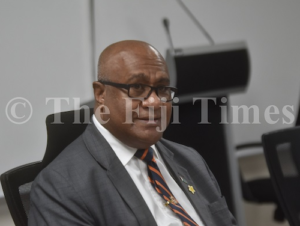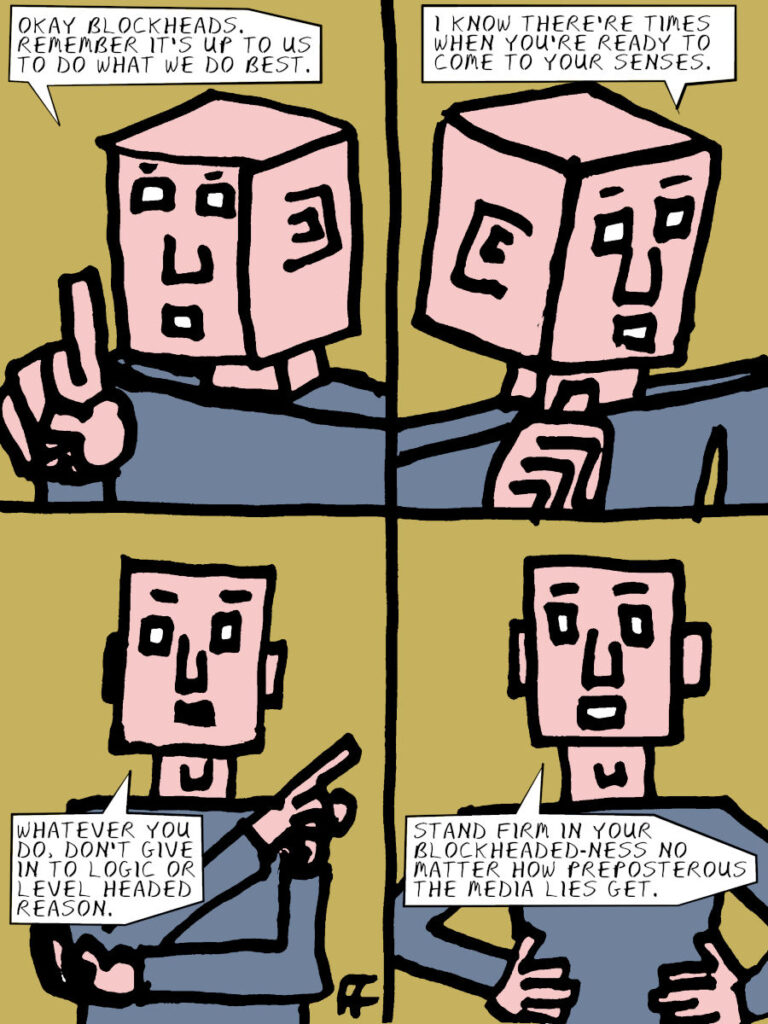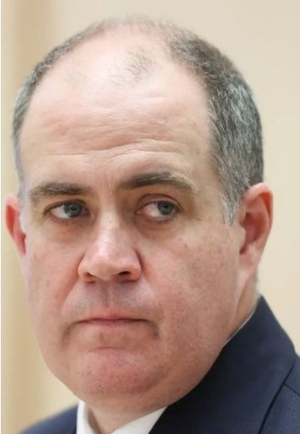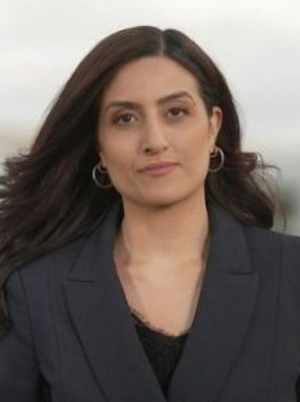Albert Einstein argued,
[P]rivate capital tends to become concentrated in few hands”, resulting in “an oligarchy of private capital the enormous power of which cannot be effectively checked even by a democratically organised political society.
Moreover, under existing conditions, private capitalists inevitably control, directly or indirectly, the main sources of information (press, radio, education).
It is thus extremely difficult, and indeed in most cases quite impossible, for the individual citizen to come to objective conclusions and to make intelligent use of his political rights. [May 1949 edition of socialist magazine Monthly Review]
Thomas Jefferson wrote of Newspapers Lies:
Nothing can now be believed which is seen in a newspaper. Truth itself becomes suspicious by being put into that polluted vehicle. The real extent of this state of misinformation is known only to those who are in situations to confront facts within their knowledge with the lies of the day. I really look with commiseration over the great body of my fellow citizens, who, reading newspapers, live & die in the belief, that they have known something of what has been passing in the world in their time;… General facts may indeed be collected from them, such as that Europe is now at war, that Bonaparte has been a successful warrior, that he has subjected a great portion of Europe to his will, but no details can be relied on. I will add, that the man who never looks into a newspaper is better informed than he who reads them; inasmuch as he who knows nothing is nearer to truth than he whose mind is filled with falsehoods & errors. He who reads nothing will still learn of the great facts, and the details are all false.
Chronologically,
– vested interests journalism made the killing, capturing, transporting and slavery of Africans acceptable in colonial times and during the early United States of America.
– corrupted journalists drummed up hate against Indigenous peoples and the later desire for war and the pillage of Mexico.
- Hearst newspapers’ journalists convinced enough Americas to war on Spain, Cuba and the Filipinos
- journalists working for President Wilson’s established Committee on Public Information created a public desire for entering the First World War.
– journalists made U.S. corporations arming of Hitler’s poor Nazi Germany acceptable as a ‘bulwark’ against Communist Soviet Russia.
– Julius Streicher, Nazi newspaper publisher was convicted of crimes against humanity at the Nuremberg trials and was executed by hanging on October 16, 1946
- cooperating journalists made a U.S. genocidal war in Vietnam, Laos and Cambodia appear necessary as was war in Korea before, and neo-colonial U.S. wars in Africa, Latin America and the Middle East thereafter.
- Journalists reported non-existent popular demonstrations fired upon in Libya, which the UN had cited for its higher standard of living than 9 European countries. Journalists hail US/NATO bombing and terrorist army, slander Gaddafi – did not cover a near million Libyans wildly demonstrating in support of their wealthy and democratic Green Book Arab Socialist government.
– All mainstream journalists ridiculed Gaddafi’s wonderful address to the UN General Assembly in which he, as no one had done before, described how the UN has sanctified US-NATO invasions and bombings in falsification of its charter from its very beginning, and labeled the UN Security Council correctly, a ‘council of terror.’
- The CIA currently maintains a network of journalists around the world, who influence opinion through the use of covert propaganda, and provide direct access to a large amount of newspapers and periodicals, scores of press services and news agencies, radio and television stations, commercial book publishers, and other foreign media outlets.”
WAR BY MEDIA
At London’s Trafalgar Square, on October 8, 2011 during the U.S. U.K. genocide in Iraq, Australian editor, publisher, activist and founder of WikiLeaks Julian Assange spoke encouragingly about how “peace can be started by truth”:
“. . . and that is something I want to talk about. What can we do with our values, what can we do at all in relation to this (Iraq) war? Because the reality is Margaret Thatcher had it right; there is no society any more. What there is is a transnational security elite that is busy carving up the world using your tax money.
To combat that elite we must not petition; we must take it over.
We must form our own networks of strength and mutual value which can challenge those strengths and self-interested values of the warmongers in this country and in others that have formed hand in hand an alliance to take money from the United States, from every NATO country, from Australia and launder it through Afghanistan, launder it through Iraq, lander it through Somalia , launder it through Yemen, launder it through Pakistan and wash that money in peoples blood.
I don’t need to tell you the depravity of war, you are all too familiar with its images, with the refugees of war, with information that we have revealed showing the everyday squalor and barbarity of war.
Information such as the individual deaths of over 130,000 people in Iraq. Individual deaths that were kept secret by the US military who denied that they ever counted the deaths of civilians.
“Wars Can Be Undone!”
Instead I want to tell you what I think is the way that wars come to be and that wars can be undone.
“Wars Are a Result of Lies.”
In democracies, or the pseudo-democracies that we are evolving into, wars are a result of lies. The Vietnam War and the push for US involvement was the result of the Gulf of Tonkin incident . . . a lie. The Iraq War famously is the result of lies. Wars in Somalia are a result of lies. The Second World War and the German invasion of Poland was the result of carefully constructed lies.
“Average death count attributed to each journalist?”
That is war by media. Let us ask ourselves of the complicit media, which is the majority of the mainstream press, what is the average death count attributed to each journalist?
When we understand that wars come about as a result of lies peddled to the British public and the American public and the publics all over Europe and other countries then who are the war criminals?
“Journalists Are War Criminals!”
It is not just leaders, it is not just soldiers, it is journalists; journalists are war criminals. And while one might think that that should lead us to a state of despair, that the reality that is constructed around us is constructed by liars, is constructed by people who are close to those that they are meant to be policing, it should lead us also to an optimistic understanding because if wars can be started by lies, truth can be started, peace can be started by truth. So that is our task and it is your task, go and get the truth, get into the ballpark and get the ball and give it to us and we’ll spread it all over the world.” [War By Media: “Journalists Are War Criminals,” Julian Assange “The Reality That Is Constructed Around Us Is Constructed By Liars.” Celia Farber, The Truth Barrier, Oct. 10, 2023]
Julian Assange spoke succinctly about those media journalists who read us selected, bent and twisted news to disinform, blind or trick the public to support, accept or ignore ongoing atrocity wars even when massive amount of lives are being taken.
Gaza as a flagrant example:
First,
a Description of An Ongoing Unmitigated Glaringly Obvious Horrific Criminal Unbearably Cruel Genocide in Gaza and the October 7 Lethal Hamas Attack (Julian Assange said “truth can be started, peace can be started by truth.”)
Is followed by
The Reconstructed ‘Reality’ of Gaza Reconstructed by Western Media’ Wars Enabling Liars as ‘Acceptable,’ ‘Excusable,’ and/or a ‘Reasonable and ‘Proportionate’ ‘Necessary’ Defensive Reaction,’ and Not Seen as Genocide. Also a ‘Reconstructed October 7 ‘Reality’
(“Wars Are a Result of Lies,” and wars kept going by lies)
First,
A basic reality never mentioned in Western media is that Israel has been killing its own imprisoned Palestinians, imprisoned in its generations long, UN declared illegal, military occupation, while international law regarding military occupation has the occupying power responsible for the well being of its militarily occupied population. Also, Israel’s settling half a million Israelis in occupied Palestinian territory displacing the local population contravenes fundamental rules of international humanitarian law.
Since October 7, In Israeli militarily occupied and blockaded Gaza, more than 27,000 Palestinians, mostly women and children, have already been killed by Israeli Air Force bombings with U.S. supplied warplanes and bombs. Over 66,000 have been wounded,[8] Thirty percent of the homes and buildings in the cities of Gaza have been destroyed completely or in part, and thousands are believed to be still buried in the ruble. According to the United Nations Children’s Fund (UNICEF), of the thousands of maimed and crippled children, hundreds have suffered amputations of limbs, many without anaesthesia. Since October 7, Israeli attacks have killed 11,500 children in the Gaza Strip. Thousands more are missing under the rubble, most of them presumed dead.
This grim toll means that one Palestinian child is killed every 15 minutes, or that about one child out of every 100 in Gaza has perished, leading the UN to say that the Gaza Strip is a “graveyard for children.”
Half a million residents are starving with very little food and water and no electricity and most humanitarian aid blocked from being imported.[New York Times Jan. 31] Tens of thousands trying to escape the indiscriminate bombings have been forced into intensely crowded together refuge with little toilet facilities now rampant with disease. Report: Israel burns down hundreds of homes in Gaza:
Israeli newspaper Haaretz reports it has obtained exclusive information saying that Israeli army commanders have been ordering their troops to destroy unoccupied Gaza homes. The commanders have been doing this without obtaining proper legal approval, the report says. “After the structure is set on fire along with everything inside it, it is allowed to burn out until it is rendered useless,” Haaretz wrote. The newspaper cited three Israeli army officials who have been “spearheading” Gaza operations, who confirmed that this is common practice. The UN Court of Justice is still hearing the great amount of evidence of Israeli committed genocide. US State Dept said “not seeing acts of genocide” in Gaza. Some Israeli leaders and rabbis have engaged in genocidal talk praised ethnic cleansing operations, one minister suggesting nuclear bombing of Gaza. Western media keeps quoting Isreal’s right to defend itself. All the above mentioned death, suffering and destruction is continually excused by Isreal to be necessary because Israel must kill Hamas to defend itself from future Hamas attack. Western media never questions why Israel could not just defend itself with it vast arsenal of U.S. supplied weapons instead of claiming It has had to kill 10,000 children among more than 27,000 Palestinians in order protect Israel from Hamas (an acronym of its official name), the Islamic Resistance Movement, an elected Palestinian Sunni Islamist political and military organisation governing the Gaza Strip of the Israeli-occupied Palestinian territories.
The Oct. 7 Hamas Attack
It has been widely reported that at the end of a Jewish holiday on October 7, hundreds of Hamas fighters, and other militants, broke through Gaza’s militarised border, crossed into Israel by land, air and sea and reportedly (with some amount of documentation), killed civilians in the streets, in their homes and at an outdoor rave party.
Israel’s latest official estimated death toll of soldiers and civilians during the Oct. 7 Hamas invasion is 1,200.
UN Secretary General Guterres stated on October 25.
It was important to acknowledge that the attacks by Hamas did not happen in a vacuum. The Palestinian people have been subjected to 56 years of suffocating occupation. They have seen their land steadily devoured by settlements and plagued by violence; their economy stifled; their people displaced and their homes demolished. Their hopes for a political solution to their plight have been vanishing,” The grievances of the Palestinian people cannot justify those appalling attacks, and those appalling attacks cannot justify the collective punishment of the Palestinian people.
Hamas issued on Jan. 21, an 18-page document explaining its official explanation for why it launched its attack on Israel October 7, saying that it was aimed at stopping the expansion of West Bank settlements and bringing an end to the blockade of the Gaza Strip.
In its report titled “Our Narrative” Hamas, which is also the elected government of Gaza, said it wanted to “clarify” the background and dynamics of its surprise attack. The group said that avoiding harming civilians “is a religious and moral commitment” by fighters of Hamas’s armed wing, the Qassam Brigades. “If there was any case of targeting civilians; it happened accidentally and in the course of the confrontation with the occupation forces.” Hamas said in the report. “Many Israelis were killed by the Israeli army and police due to their confusion.” [19] Hamas’ describes its October 7th goal was to launch a commando-style assault on four military bases surrounding Gaza to kill or take hostage as many Israeli soldiers as possible, and a similar assault on local Israeli communities to seize civilian hostages in order to trade the hostages for Palestinian prisoners, thousands of whom are in Israeli jails, including women and children, often held without a military trial or even charges. To the Palestinian public, these prisoners are no less hostages than the Israelis held in Gaza.
Western media journalists keep citing the hostages Palestinian Hamas is holding as one of the reasons for war. But the thousands of Palestinians are currently in Israeli prisons are never mentioned. And how many of them are children? First the figure mentioned was 7,000, a month later 9,000. (Since 1967, when Israel occupied East Jerusalem, the Gaza Strip and the West Bank, it has arrested an estimated one million Palestinians, the United Nations reported last summer. One in every five Palestinians has been arrested and charged under the 1,600 military orders that control every aspect of the lives of Palestinians living under the Israeli military occupation. That incarceration rate doubles for Palestinian men — two in every five have been arrested.)
Forces of five other militant groups, Abu Ali Mustafa Brigades, Al-Azsa Martyrs’ Brigades, Omar Al-Qasim Forces, Palestinian Islamic Jihad and Mujahideen Brigades also invaded on Oct. 7, and three groups – PIJ, the Mujahideen Brigades and Al-Nasser Salah al-Deen Brigades – claim to have seized Israeli hostages, alongside Hamas, on that day.Hamas says its October 7 attacks in southern Israel were a “necessary step” against Israeli occupation of the Palestinian territories. But the Islamist group admitted in its 16-page report justifying the attack that “some faults happened” due to the rapid collapse of the Israeli security and military system, and the chaos caused along the border areas with Gaza.” The Palestinian source said through the memorandum, Hamas was sending a message to the International Court of Justice in The Hague that Hamas should not be judged solely by the events of October 7 without examining Israel’s conduct in the West Bank and Gaza over the past decades.
Hamas pointed to the historical origins of the conflict, saying “the battle of the Palestinian people against occupation and colonialism did not start on October 7, but started 105 years ago, including 30 years of British colonialism and 75 years of Zionist occupation.”
The group said it wanted to “hold the Israeli occupation legally accountable” for the suffering it had inflicted on the Palestinian people. Hamas said the attack was “to confront all Israeli conspiracies against the Palestinian people.” The militant group urged “the immediate halt of the Israeli aggression on Gaza, the crimes and ethnic cleansing committed against the entire Gaza population.”
The group blames Israeli helicopters for killing “many” of the 364 civilians massacred at the Nova music festival, saying that Hamas “had no prior knowledge of it.” The document alleges hypocrisy on the part of those who would accept civilian casualties as collateral damage in Gaza while condemning Hamas’s actions during its massacres on October 7.
The document calls for an investigation by the International Criminal Court to look at “the broader context” of the October 7 attack as part of the “struggle against colonialism, as a “national liberation and resistance movement.” The document refers to several clauses in Hamas’s updated charter from 2017, alleging that the conflict is not with the Jews, but rather with Zionism. The section condemns “what the Jews were exposed to by Nazi Germany and praises Muslim nations for having provided Jews a “safe haven” for centuries.
The document says that Hamas receives their legitimacy from the “Palestinian right to self-defence, liberation and self-determination,” claiming that according to “all norms, divine religions and international laws,” as well as the Geneva convention, parties are granted the right to resist when facing “the longest and brutalist colonial occupation,” as well as “massacres” and “oppression.”
Calls on all countries around the world to back “Palestinian resistance” and support the Palestinians’ “struggle for liberation.” Calls on its allies to “support… the Palestinian resistance,” to charge Israel with crimes, to mobilise against “Israeli aggression” on Gaza, and to stop governments from providing further aid or arms to Israel.
“Israel has destroyed our ability to create a Palestinian state by accelerating the settlement enterprise,” Hamas said, blaming the United Nations for failing to stop the process. “Were we supposed to continue waiting and relying on the helpless UN institutions?” the document asked. The organisation claimed that the Gaza had “been turned into the world’s largest open-air prison” and that the war “was necessary to end the blockade.
And it said it rejected any international and Israeli efforts to decide Gaza’s post-war future. “We stress that the Palestinian people have the capacity to decide their future and to arrange their internal affairs,” the report said, adding that “no party in the world” had the right to decide on their behalf.
Unknown to most western audiences, there has been a steady trickle of evidence from Israeli sources over the past two months implicating Israel’s own military in many of the killings attributed to Hamas. A police investigation shows Israeli Apache helicopters opened fire on attendees of the Nova music festival during the 7 October Hamas attack. [25] Israeli resent investigations have found that a large fraction of the bodies recovered had been charred beyond all recognition. Since the Hamas fighters had only been carrying rifles, Kalashnikov rifles and other small arms, all those victims must have been killed by explosive tank shells and Hellfire missiles. Indeed, newly released video footage revealed that hundreds of Israeli cars had been incinerated by such munitions, suggesting that many if not most of the Israelis killed fleeing the dance festival had probably died at the hands of trigger-happy Apache pilots.
At Kampala, Uganda, on Jan 17, United Nations Secretary-General António Guterres addressing a summit of the Group of 77 (G-77) and China, with more than 130 countries– the largest grouping of the global South, representing 80 per cent of the planet’s population, denounced Israel for the “heartbreaking” deaths of Palestinian civilians in Gaza and called it unacceptable to resist statehood for the Palestinian people.[Reuters]
(Julian Assange said “truth can be started, peace can be started by truth.”)
Now
The Reconstructed ‘Reality’ of Gaza Reconstructed by Western Media’ Wars Enabling Liars to portray the annihilation in Gaza as ‘Acceptable,’ ‘Excusable,’ and/or a ‘Reasonable and ‘Proportionate’ ‘Necessary’ Defensive Reaction,’ and Not Seen as Genocide.
(“,wars can be started by lies,” – then kept going by lies)
Hamas “beheading 40 babies” – headlines and the front pages of countless western news outlets. U.S. President Biden claimed to have seen “confirmed photos of terrorists beheading babies,” and that “Israeli women were raped, assaulted, paraded as trophies.”
This is journalism that projects thinking the wholesale destruction of Gaza to eliminate Hamas is morally justified.
Hamas is pictured as bloodthirsty savages. Hamas beheaded 40 babies, baked another in an oven, carried out mass, systematic rapes, and cut a foetus from its mother’s womb.
An Israeli first responder to the October 7 terror attack has claimed that Hamas terrorists roasted a baby in an oven in shocking video testimony. Asher Moskowitz, of the United Hatzalah first responder group, published a video of himself speaking to a camera, delivering his witness account.
US Secretary of State Antony Blinken even describing in graphic detail – and wholly falsely – a Hamas attack on an Israeli family: “The father’s eye gouged out in front of his kids. The mother’s breast cut off, the girl’s foot amputated, the boy’s fingers cut off before they were executed.Then their executioners sat down and had a meal.” Hamas beheaded 40 babies, baked another in an oven, carried out mass, systematic rapes, and cut a foetus from its mother’s womb.
Efforts by the United Nations to investigate these claims being obstructed by Israel go unreported.
Israel’s president, Isaac Herzog, set the tone as he spoke about October 7. “It’s an entire nation out there that is responsible. This rhetoric about civilians not aware, not involved, it’s absolutely not true. They could’ve risen up, they could have fought against that evil regime.”
In different ways, the sentiment that the Palestinians are collectively responsible for the actions of Hamas in killing of about 1,200 Israelis and abduction of over 200 – and therefore deserve what is coming to them – has been echoed far beyond Israel’s borders. In the US, Senator Lindsey Graham called for the wholesale destruction of Gaza.
Worldwide reaching colonial media journalism will not report the truth that Israel admits Apache helicopters fired on their own civilians running from the Supernova music festival – even when Tel Aviv Ynet reports it to Israelis.
Western media readiness to re-examine 7 October long after those events took place.
“Israel has the right to defend itself!” Israel has the right to defend itself!” Each and every time Western media conglomerates consider it necessary to report the number of thousands killed in Gaza, media journalists repeat words to the effect that this is “a response to October 7 attack by Hamas — considered a terrorist group by the United States and European Union.” Hamas is a terrorist group!
Blacking 0ut from Unfavourable News Indicting U.S. led West
This section regarding criminal journalism’s reconstructed “reality” of Gaza and Hamas is perforce quite short, brief because simply not reporting reality is the most major crime in Western entertainment/news conglomerate journalism in hiding 90% of reality. Never mentioning for example, the reality of the immense and deadly suffering of the Palestinians, which is the motive for the very existence of the Hamas militant group. Recently, many news hours have been begun simply covering other world and local events to the exclusion of any mention of the extermination of Palestinians in Gaza
In Conclusion
White supremacy colonisers always getting away with mass
murder both in real time and for generations thereafter has been for some time the accomplishment of the war investor controlled CIA overseen journalists of giant entertainment/news conglomerates, which have been allowed to usurp the use of public owned broadcasting frequencies. This is a government collaboration with war investors, which can and must be challenged, at the same time as taking down the credibility of the war enabling journalists of criminal mainstream media.
Fortunately, there is declining trust in mainstream news outlets, pushing people toward alternative online sources and social media for information.
Do journalists feel the shame when they pass on deceptive info? Yes, of course some do on occasion, and there is always a segment of the citizenry of varying size that feels responsible for the crimes of its government.
The more info the public has makes it more difficult to pursue policies of war on innocent populations, so the public is a threat that needs to be countered. So whenever an invasion is planned, a huge public relations campaign goes into gear.
An Advisory Based on Julian Assange’s Counsel
“So that is our task and it is your task, go and get the truth, get into the ballpark and get the ball and give it to us and we’ll spread it all over the world.”
Countering the CIA-overseen giant entertainment/news/information conglomerates wars enabling deceptive journalism with truth can be more effective than attacking the wars ordering high government officials, both those elected and those appointed, who in reality must take orders form the ‘deep state’ Financial-Military-Industrial-Complex ‘deep pocket’ war investors.
Julian Assange has brought to our attention the pleasant-looking evening news anchor who captivates TV audiences with alternating joviality and gravitas, asking whether they should be seen as insidiously evil as they generate support for horrific suffering, death, maiming and destruction.
Assange seems to have tasked us to awaken a critical number of decent but unwary citizens to the realisation that a trusted prime time personality of theirs is in fact a war criminal?
ENDNOTES
The post
The “Reality” around Us is Constructed by Liars: “Journalists are War Criminals” first appeared on
Dissident Voice.
1 In a 14 June 1807
letter to John Norvell. The Founders’ Constitution, Volume 5, Amendment I (Speech and Press), Document 29, The University of Chicago Press.
2 Wall Street and the Rise of Hitler, Antony Cyril Sutton British-American writer, researcher, economist, and Stanford U. professor.
3 There exists not one photo or video of a peaceful protest (CNN reported peaceful protests being fired upon by Libyan soldiers and police.) “There Was No Libyan Peaceful Protest, Just Murderous Gangs and Nic Robertson,” Information Clearing House, June 20, 2011 . Long time Italian Prime Minister says
Libyans love Gaddafi as Italians P. Nearly one million Libyans, out of a total population of six million, wildly demonstrated in favor of their nation’s government with a mile long green flag while listening to Gaddafi’s voice even as NATO warplanes were bombing nearby in Tripoli.
4 “Worldwide Propaganda Network Built by the C.I.A,” December 26, 1977, New York Times.
5 Reports Gaza Ministry of Health and UN
6 Aljazeera, Feb. 2.
7 Report: “Israel burns down hundreds of homes in Gaza” Aljazeera, Feb. 1.
8 US ‘not seeing acts of genocide’ in Gaza, State Dept says, Reuters, Jan. 3, 2024
10 Israel-Hamas War Israel Lowers Oct. 7 Death Toll Estimate to 1,200, New York Times, Nov 10, 2023.
13 The awful crimes against humanity ordered by President Eisenhower in Laos, Guatemala, Congo and other places indicate that the president was under the thumb of the Military Industrial Complex he warned of on the day he left office.
This post was originally published on Dissident Voice.





 PETA
PETA







 Feeding Tomorrow/Instagram
Feeding Tomorrow/Instagram Oliver English
Oliver English “The clue is in the name: ‘Lawyers for Israel’ thought that they could run a campaign to bully an ABC journalist out of her job —…
“The clue is in the name: ‘Lawyers for Israel’ thought that they could run a campaign to bully an ABC journalist out of her job —… 




